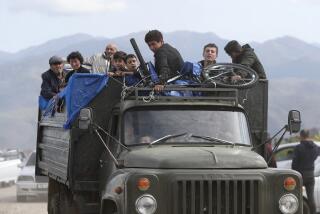Central Asians, Muslim Neighbors OK Rail Link : Alliances: While the West woos Moscow, Iran, Pakistan and Turkey beat a path to the new nations--all former Soviet republics.
- Share via
MOSCOW — Ties between the former Soviet Central Asian republics and the nations of Iran, Pakistan and Turkey were strengthened Sunday when their leaders agreed to construct a new railroad line along the ancient Silk Road, a gas pipeline and a highway, officials said.
While the West has concentrated on building relations with Moscow, the governments of Iran, Pakistan and Turkey have been beating a path to the capitals of former Soviet republics of Uzbekistan, Kazakhstan, Tajikistan, Turkmenistan, Kyrgyzstan and Azerbaijan--all of which have predominantly Muslim populations.
Leaders of Iran, Pakistan and Turkey met with the leaders of the former Soviet Central Asian republics in Ashgabat (formerly known as Ashkhabad), the capital of Turkmenistan, over the weekend to foster trade with these newly independent countries.
And Moscow, which maintained almost complete dominance over Central Asia for several decades, appeared to view with consternation the growing roles of Iran, Pakistan and Turkey in the region.
“Vesti,” the evening news on Russian television, said the Ashgabat summit signals that the Muslim republics of the former Soviet Union are rapidly moving out of Russia’s sphere of influence and into the spheres of influence of the powerhouses of the Islamic world.
“Now we can say that Central Asia will be influenced more powerfully by its Muslim neighbors than by the Commonwealth of Independent States,” the “Vesti” commentator said.
“As a result, Russia will have at its southern frontier a dynamically growing union of independent Muslim states rather than separate republics that seek cooperation with Moscow.”
But Murad Kharanov, a spokesman for the Turkmenistan government, stressed that expanding relations between these former Soviet republics and Iran, Pakistan and Turkey should not cause alarm in Moscow or the West.
“The railroad, pipeline and highway will help the economy of the region,” Kharanov said in a telephone interview from Ashgabat. “The treaty should not be viewed as a change of policy (toward Moscow). It reflects natural economic cooperation between the neighboring countries. It is the same as, say, Belarus cooperating with Poland, Hungary and others. No one should treat it as something extraordinary.”
Kharanov stressed that the agreements reached during the Ashgabat summit are purely economic and do not reflect an increase of religious or political influence on the region from Iran, Pakistan or Turkey.
The “Vesti” commentator, however, insisted that the new economic agreements will weaken the Central Asian states’ ties to Russia and the other republics of the Commonwealth of Independent States, the loose alliance that succeeded the Soviet Union.
“If the decisions made today in Ashgabat are realized, natural gas will be supplied to Europe via Iran and Turkey. . . . The same goes for the railroad, which will provide direct access to the Mediterranean for the Central Asian republics,” he said.
“Thus the Asian republics will be largely economically independent from the Commonwealth of Independent States.”
Although Kazakhstan, Uzbekistan, Tajikistan, Kyrgyzstan, Azerbaijan and Turkmenistan have all joined the Commonwealth of Independent States, vast religious, cultural and historical differences separate them from the Slavic members of the bloc.
Fed up with the bickering among the former Soviet republics, Turkmenistan President Saparmurad Niyazov said that he and the leaders of the other Muslim nations formerly in the Soviet Union are eager to forge ties with countries interested in constructive partnerships.
“Relations between the countries in the Commonwealth of Independent States are in a divisive mode--they are dividing property among themselves and arguing about it,” Niyazov said during the Ashgabat summit, according to Kharanov. “We need alternatives.”
Iran, Pakistan and Turkey are eager to be those alternatives--and thereby increase their spheres of influence.
“Competition exists everywhere in the world,” Iranian President Hashemi Rafsanjani said. “We do not deny that we are striving to develop all-inclusive economic cooperation with these republics.”
Iran and Turkey have both tried to make reputations by negotiating a settlement in the intractable conflict between the former Soviet republics of Azerbaijan and Armenia over the Nagorno-Karabakh region, a predominantly Armenian enclave in Azerbaijan.
Turkey--with its mix of moderate Islam and Western economy--appears to have a leg up on the others. All the Central Asian republics apart from Tajikistan speak Turkic dialects.
But Iran, Pakistan and even Saudi Arabia have been making dramatic overtures to the former Soviet republics with large Muslim populations, including donations of religious materials, food and medicines. There has been a revival of Islam in these republics in the last few years as the Soviet authorities abandoned the suppression of religion. None of the republics has yet chosen an Islamic government, but Islamic opposition groups are gaining power.
Andrei Ostroukh, a researcher in The Times’ Moscow bureau, contributed to this report.
More to Read
Sign up for Essential California
The most important California stories and recommendations in your inbox every morning.
You may occasionally receive promotional content from the Los Angeles Times.










